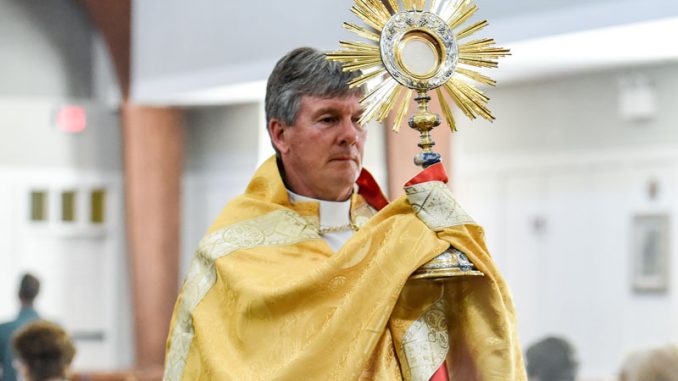
LEXINGTON—Receiving the true body and blood of Christ through the Eucharist is what makes Catholicism powerful and unique.
This tradition is celebrated each year on the feast of Corpus Christi.
In addition to the Holy Sacrifice of the Mass on the feast day, many churches also participate in processions to honor Christ’s presence in the Eucharist. These observances occur two months after Holy Thursday, which is the Last Supper.
During Mass the readings and homilies reflect the importance of the Eucharist. Afterward, parishioners and clergy often process through the streets or around their church campus in appreciation of the gifts. Appropriately, Corpus Christi Church in Lexington is one of the parishes that annually celebrates the feast day with a traditional procession.
Father Joseph Romanoski, pastor, said he enjoys the day because it emphasizes that Holy Communion is not just an act that the Church performs at each Mass, but is a reminder of what the Last Supper was all about.

“Sometimes when we do something over and over again, we begin to tune it out and the reason why we are doing it becomes lost,” Father Joe said. “The Eucharist is the body and blood of Christ. Corpus Christi is a reminder to not only parishioners, but to clergy as well, that what we are doing up there on the altar when we present the gifts is important. The bread is the flesh and wine is the blood of Christ.”
Father Joe said the Corpus Christi procession was a little different this year in order to follow safety guidelines for the coronavirus.
Instead of a big group processing behind the pastor, Father Joe carried the monstrance himself as parishioners watched from their cars. Then, he blessed each family as they exited the parking lot, or “processed by” in their cars.
“It isn’t the same, but the meaning is not lost,” he said.
St. Gregory the Great in Bluffton and other churches also held more subdued processions, with only clergy and altar servers participating.
Corpus Christi Church also celebrated nine days praying a novena before their Sunday feast and procession.
“This is such a special time for our parish to be able to really focus in on the Eucharist,” Father Joe said.
He noted that not every church celebrates Corpus Christi, but said it has been a part of the Roman Catholic religion for hundreds of years. The first one took place in 1264 by Pope Urban IV.
“As a kid, my parish set up three altars that we would process to with three different Gospels read at each one,” he reminisced. “We actually walked around the town to neighboring parishes. It was a way for us to publicly demonstrate our love for the Eucharist.”
Joan Patrick, who has been a parishioner of Corpus Christi since 2012, said she loves the procession because it makes her feel actively involved.
“It is stronger than just saying ‘Amen,’” Patrick said. “It is a community embrace.”



